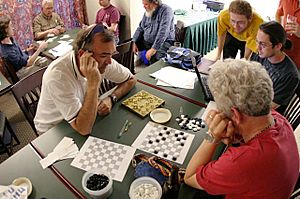Combinatorial game theory facts for kids
Combinatorial Game Theory, often called CGT, is a cool part of applied mathematics and theoretical computer science. It's all about studying certain types of games, but it's different from the "traditional" game theory you might hear about, which often looks at economics or games like poker. CGT started by looking at "impartial games," especially a two-player game called Nim. The main goal is to "solve" these games and figure out the best way to play them.
Contents
What is Combinatorial Game Theory?
Imagine games where skill and smart moves are everything, and there's no luck involved. That's exactly what Combinatorial Game Theory focuses on! It's like being a detective for games, trying to figure out the best moves and who will win if both players play perfectly.
What Makes a Game "Combinatorial"?
For a game to be studied using Combinatorial Game Theory, it needs to follow some specific rules. Think of these as the "ingredients" for a CGT game:
- The game must have at least two players.
- Players take turns, one after the other. This is called being sequential.
- Everyone knows everything about the game. There are no hidden cards or secret information, unlike in games like poker. This is called perfect information.
- There's no luck involved. No dice rolls, no drawing cards randomly. The game is deterministic, meaning the outcome depends only on the players' choices.
- There's a clear, limited number of moves possible at any point.
- The game must always end. It can't go on forever.
- The game ends when one player can't make any more moves.
CGT mostly looks at games played by two people. These games have a clear end, and they result in a winner and a loser. There are no ties or draws.
How Do We Understand These Games?
In Combinatorial Game Theory, these games can be thought of like a map or a "tree." Each point on this map (called a vertex) represents a different stage of the game. You can reach these stages by making certain moves.
CGT experts are very interested in finding the "value" of these games. This "value" helps them understand which player has an advantage. It also shows how strong a position is. They also study something called game addition. This is when you combine two games into one. In a combined game, a player on their turn chooses to make a move in only one of the two games. The other game stays exactly as it was. It's like playing two mini-games at once, but you only move in one each turn!
Who Started Combinatorial Game Theory?
The main people who started this fascinating field are Elwyn Berlekamp, John Horton Conway, and Richard K. Guy. They all worked together in the 1960s. They published a famous book called Winning Ways for Your Mathematical Plays. Their work laid the foundation for how we understand and analyze these strategic games today.
More to Explore
 In Spanish: Teoría de juegos combinatorios para niños
In Spanish: Teoría de juegos combinatorios para niños
 | Bayard Rustin |
 | Jeannette Carter |
 | Jeremiah A. Brown |


